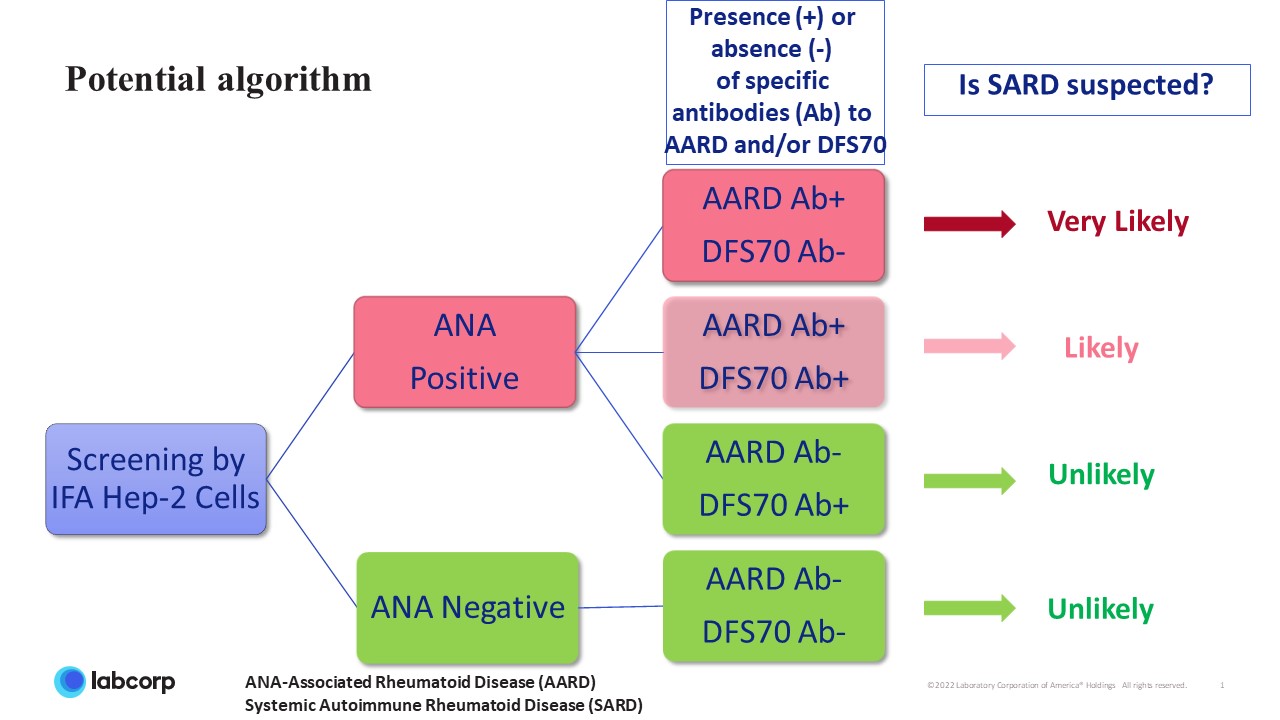Session Information
Session Type: Poster Session A
Session Time: 9:00AM-11:00AM
Background/Purpose: The discovery and characterization of the dense fine speckled (DFS, ICAP AC-2) nuclear pattern of antinuclear autoantibodies (ANA) detected in HEp-2 cells by indirect immunofluorescence assay (IFA) more than 20 years ago has transformed our view on ANA testing. Anti-DFS70 antibodies are associated with this DFS pattern by IFA while their clinical associations remain an immunological enigma. Unlike other ANA, there is a growing body of evidence that anti-DFS70 antibodies, when present in high titers and in isolation (i.e. in the absence of any accompanying autoimmune disease-specific antibodies) are useful to aid in the exclusion of systemic autoimmune rheumatic diseases (SARD), also called ANA-associated rheumatic diseases (AARD). The correlation between the DFS pattern by IFA observed through HEp-2 cells and the presence of anti-DFS70 antibodies detected by enzyme-linked immunosorbent assay (ELISA) has been the subject of increasing interest in autoimmune research. This study provides supporting evidence of the significant association between the DFS pattern by IFA and anti-DFS70 antibodies by ELISA and offers a potential algorithm to triage patients to exclude SARD/AARD.
Methods: 150 positive and 20 negative serum specimens for DFS pattern by HEp-2 cells by IFA, (Sprinter XL/EuroPattern, Euroimmun, NJ), were analyzed for presence of anti-DFS70 antibodies by ELISA (QuantaLyzer 3000, Werfen CA). The agreement of the DFS70 by ELISA was established by direct comparison of results with those generated by an established or reference method HEp-2 cells DFS pattern by IFA.
Results: When compared, samples between DFS pattern by HEp-2 cells IFA and anti-DFS70 antibodies by ELISA yielded an agreement of 97.1% (95% confidence intervals of 93.1-98.7%), McNemar’s Test Chi Square of p >0.999, with a relative sensitivity of 98.0% and a specificity of 90.0%.We propose the following potential algorithm to triage patients with or without SARD/AARD (see figure).
Conclusion: This study demonstrated that accurate reading of DFS pattern by HEp-2 IFA identification provided a significant rate of anti-DFS70 antibodies detected by ELISA. The correlation between the DFS pattern by HEp-2 IFA observed and the presence of anti-DFS70 antibodies detected by ELISA could provide valuable insights into autoimmune diseases. The combined use of these techniques allows for a more comprehensive assessment of autoantibody profiles, aiding in accurate classification, prognosis, and personalized treatment strategies. Further research is needed to elucidate the clinical implications and significance of this anti-DFS antibodies in different conditions.
To cite this abstract in AMA style:
ricchiuti V, Nappi M, Chun K, Grover A, Punzalan R. Correlation of Anti-DFS70 Autoantibodies by ELISA with HEp-2 Cells DFS Pattern by IFA [abstract]. Arthritis Rheumatol. 2023; 75 (suppl 9). https://acrabstracts.org/abstract/correlation-of-anti-dfs70-autoantibodies-by-elisa-with-hep-2-cells-dfs-pattern-by-ifa/. Accessed .« Back to ACR Convergence 2023
ACR Meeting Abstracts - https://acrabstracts.org/abstract/correlation-of-anti-dfs70-autoantibodies-by-elisa-with-hep-2-cells-dfs-pattern-by-ifa/

